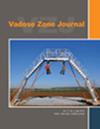Validating coupled flow theory for bare‐soil evaporation under different boundary conditions
IF 2.8
3区 地球科学
Q3 ENVIRONMENTAL SCIENCES
引用次数: 0
Abstract
Abstract Evaporation from bare soil is an important hydrological process and part of the water and energy balance of terrestrial systems. Modeling bare‐soil evaporation is challenging, mainly due to nonlinear couplings among liquid water, water vapor, and heat fluxes. Model concepts of varying complexity have been proposed for predicting evaporative water and energy fluxes. Our aim was to test a standard model of coupled water, vapor, and heat flow in the soil using data from laboratory evaporation experiments under different boundary conditions. We conducted evaporation experiments with a sand and a silt loam soil and with three different atmospheric boundary conditions: (i) wind, (ii) wind and short‐wave radiation, and (iii) wind and intermittent short‐wave radiation. The packed soil columns were closed at the bottom (no water flux) and instrumented with temperature sensors, tensiometers, and relative humidity probes. We simulated the evaporation experiments with a coupled water, vapor, and heat flow model, which solves the surface energy balance and predicts the evaporation rate. The evaporation dynamics were predicted very well, in particular the onset of stage‐two evaporation and the evaporation rates during the stage. A continuous slow decrease of the measured evaporation rate during stage‐one could not be described with a constant aerodynamic resistance. Adding established soil resistance parametrizations to the model significantly degraded model performance. The use of a boundary‐layer resistance, which takes into account the effect of point sources of moisture, improved the prediction of evaporation rates for the sandy soil, but not for the silt loam.不同边界条件下裸土蒸发耦合流动理论的验证
裸土蒸发是一个重要的水文过程,是陆地系统水能量平衡的组成部分。模拟裸土蒸发是具有挑战性的,主要是由于液态水、水蒸气和热通量之间的非线性耦合。已经提出了各种复杂程度的模型概念来预测蒸发水和能量通量。我们的目的是使用不同边界条件下实验室蒸发实验的数据来测试土壤中耦合水、蒸汽和热流的标准模型。我们在三种不同的大气边界条件下(i)风、(ii)风和短波辐射、(iii)风和间歇性短波辐射)对沙质和粉质壤土进行了蒸发实验。填充土柱底部封闭(无水通量),并配有温度传感器、张力计和相对湿度探头。利用水、汽、热流耦合模型模拟蒸发实验,解决了地表能量平衡问题,预测了蒸发速率。对蒸发动力学进行了很好的预测,特别是第二阶段蒸发的开始和该阶段的蒸发速率。在第一级测量的蒸发速率的持续缓慢下降不能用恒定的气动阻力来描述。在模型中加入已建立的土壤阻力参数会显著降低模型的性能。边界层阻力的使用,考虑了点湿源的影响,改善了砂质土的蒸发速率预测,但对粉质壤土没有效果。
本文章由计算机程序翻译,如有差异,请以英文原文为准。
求助全文
约1分钟内获得全文
求助全文
来源期刊

Vadose Zone Journal
环境科学-环境科学
CiteScore
5.60
自引率
7.10%
发文量
61
审稿时长
3.8 months
期刊介绍:
Vadose Zone Journal is a unique publication outlet for interdisciplinary research and assessment of the vadose zone, the portion of the Critical Zone that comprises the Earth’s critical living surface down to groundwater. It is a peer-reviewed, international journal publishing reviews, original research, and special sections across a wide range of disciplines. Vadose Zone Journal reports fundamental and applied research from disciplinary and multidisciplinary investigations, including assessment and policy analyses, of the mostly unsaturated zone between the soil surface and the groundwater table. The goal is to disseminate information to facilitate science-based decision-making and sustainable management of the vadose zone. Examples of topic areas suitable for VZJ are variably saturated fluid flow, heat and solute transport in granular and fractured media, flow processes in the capillary fringe at or near the water table, water table management, regional and global climate change impacts on the vadose zone, carbon sequestration, design and performance of waste disposal facilities, long-term stewardship of contaminated sites in the vadose zone, biogeochemical transformation processes, microbial processes in shallow and deep formations, bioremediation, and the fate and transport of radionuclides, inorganic and organic chemicals, colloids, viruses, and microorganisms. Articles in VZJ also address yet-to-be-resolved issues, such as how to quantify heterogeneity of subsurface processes and properties, and how to couple physical, chemical, and biological processes across a range of spatial scales from the molecular to the global.
 求助内容:
求助内容: 应助结果提醒方式:
应助结果提醒方式:


